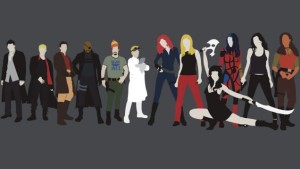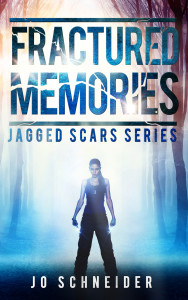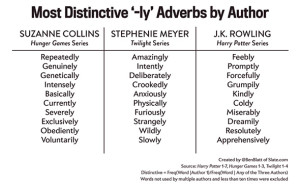 Near the end of last year I went to a panel at Salt Lake ComicCon that was a “Why We Love Joss Wheadon” fan fest. I like a whole lot of Joss Wheadon’s stuff, so I went thinking I could use what others said in my writing.
Near the end of last year I went to a panel at Salt Lake ComicCon that was a “Why We Love Joss Wheadon” fan fest. I like a whole lot of Joss Wheadon’s stuff, so I went thinking I could use what others said in my writing.
First rule of writing I ever learned: If you like something, steal the hell out of it.
When the questions started, at least ten people cited the characters as their favorite parts about Joss’ stories. The rest of the people in the room nodded their heads like crazed bobble head dolls. Toy Story, Firefly, Buffy, Angel, Dollhouse, Dr. Horrible’s Sing-Along Blog, the Avenger movies…and that’s just the tip of the iceberg.
It didn’t take long for me to join the bobble head nation. It’s true, Firefly is a quirky universe, but Jane names his guns and Wash plays with dinosaur figurines. While vampires have been done and done, there’s something about Buffy’s crew that keeps us coming back for more. And let’s be serious, without the great characters is Dr. Horrible’s Sing-Along Blog, it would have been just another obscure upload in the YouTube ether.
As I listened while grown men and women gushed all over the floor about Joss’ characters, I thought, “It can’t be that easy.”
Could it?
Turns out it’s not particularly easy, but is it that simple.
If people don’t like your characters, or at least identify with them, they stop caring, which leads to them changing the channel, switching shows on Netflix or putting your book down. Because let’s face it, who has time to waste on people you don’t like? Real life forces us to do this, but we have control over our entertainment. (Unless you lose the battle for the remote, but that’s a totally different issue.)
In proper writer fashion, I Googled the top rated books about writing character and bought a couple. I trolled blogs, because thousands of people have come before me, and surely one or two of them have something helpful to say. I started analyzing the shows we were watching. I made my husband think it was his idea to find interesting character traits, which I’m not going to lie, has been very helpful.
Now I could go on and on and on about this, but due to time, I’ll boil it down to what have become my top four character rules.
1-Each character needs a goal. Something they want. This must be the driving force of every decision they make in the story. A football player wants to win that big game. The nerdy guy wants to get the popular girl. The solider wants to get back home in one piece.
2-More important than what the character wants so badly, is what the character needs. They don’t know they need it until it smacks them in the face like wet fish—can’t miss that. At the fish smacking moment, the character changes, possibly shifting their decisions away from their once goal to what they now realize is much more important. Suddenly winning that big game isn’t as important as being with their family, or being rich pales in comparison with the true love they’ve discovered along the way.
3-Delve into your characters. Give them more than an age, an occupation and a gender. Go beyond the first layer of problems and get to the bottom of what your character is about. Why do the doctor’s hands tremble each time he takes a scalpel? What really happened? Does he have nightmares about it? How does it affect his daily decisions? How does it affect his main goal in the story?
4-#Bemeantocharacters. Just do it. Make their adorable, little lives miserable. As an author you must allow them a respite or two, but make sure that the emotional spectrum looks like a crazed polygraph readout and not a flat line full of stereotypes and tropes.
Earlier this year I released Fractured Memories, my first Indie book, and the first in a five book series. My beta readers told me my characters were flat (this was just before ComicCon) so when I revised it, I gave them a boost. Fast forward to now, and quite a few of the reviews for the book mention the characters and how much the readers liked them. This brings that creepy, evil author smile to my lips.
Achievement unlocked.
There’s always more to learn, but it’s good to know I’m on the right track!
About the Author: Jo Schneider
 Jo Schneider grew up in Utah and Colorado, and finds mountains helpful in telling which direction she is going. One of Jo’s goals is to travel to all seven continents—five down and two to go.
Jo Schneider grew up in Utah and Colorado, and finds mountains helpful in telling which direction she is going. One of Jo’s goals is to travel to all seven continents—five down and two to go.
Another goal was to become a Jedi Knight, but when that didn’t work out, Jo started studying Shaolin Kempo. She now has a black belt, and she keeps going back for more. An intervention may be in order.
 Being a geek at heart, Jo has always been drawn to science fiction and fantasy. She writes both and hopes to introduce readers to worlds that wow them and characters they can cheer for.
Being a geek at heart, Jo has always been drawn to science fiction and fantasy. She writes both and hopes to introduce readers to worlds that wow them and characters they can cheer for.
Jo lives in Salt Lake City, Utah with her adorkable husband, Jon, who is very useful for science and computer information as well as getting items off of top shelves.
- Blog/Website: http://joannschneider.com/
- Amazon-Fractured Memories



